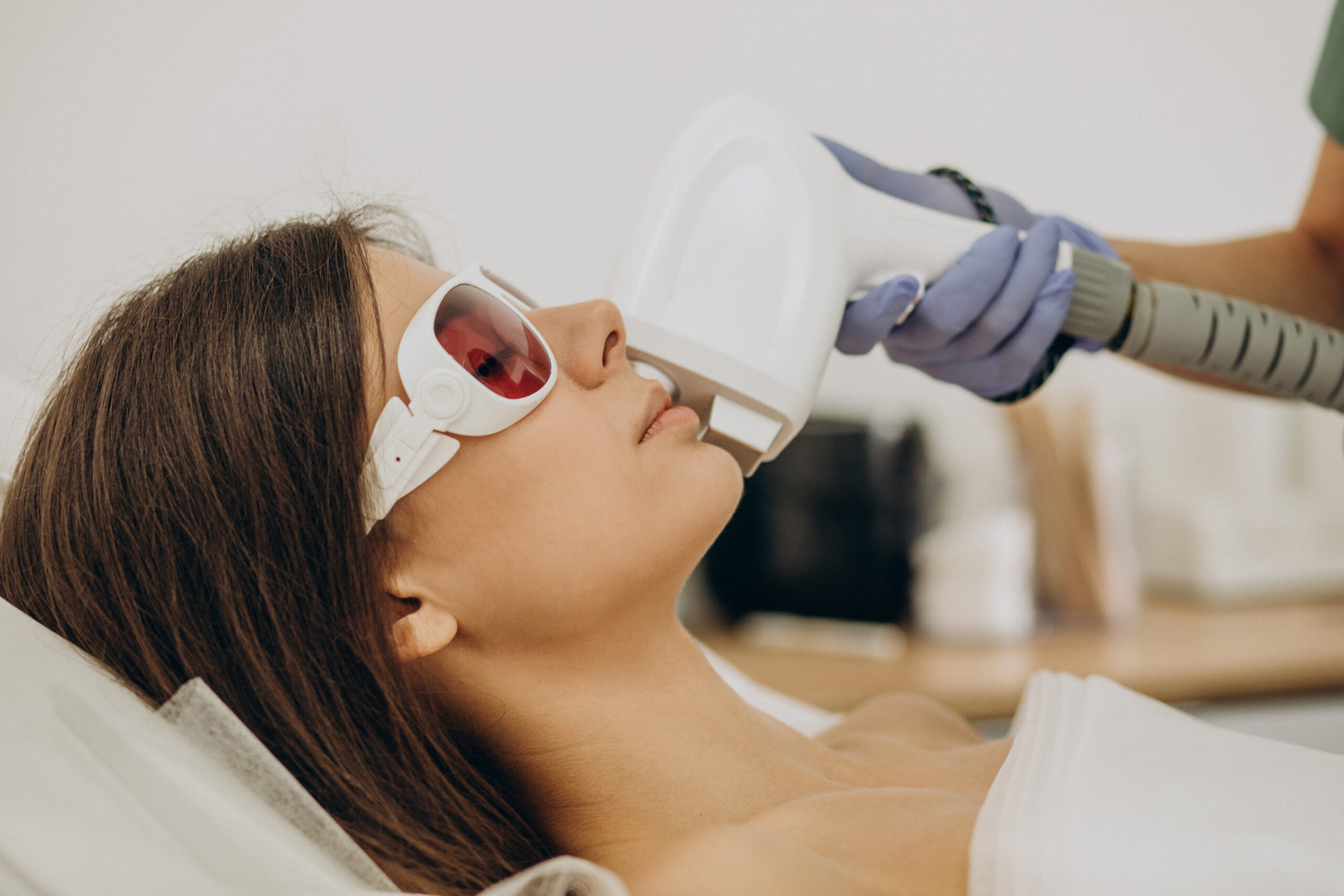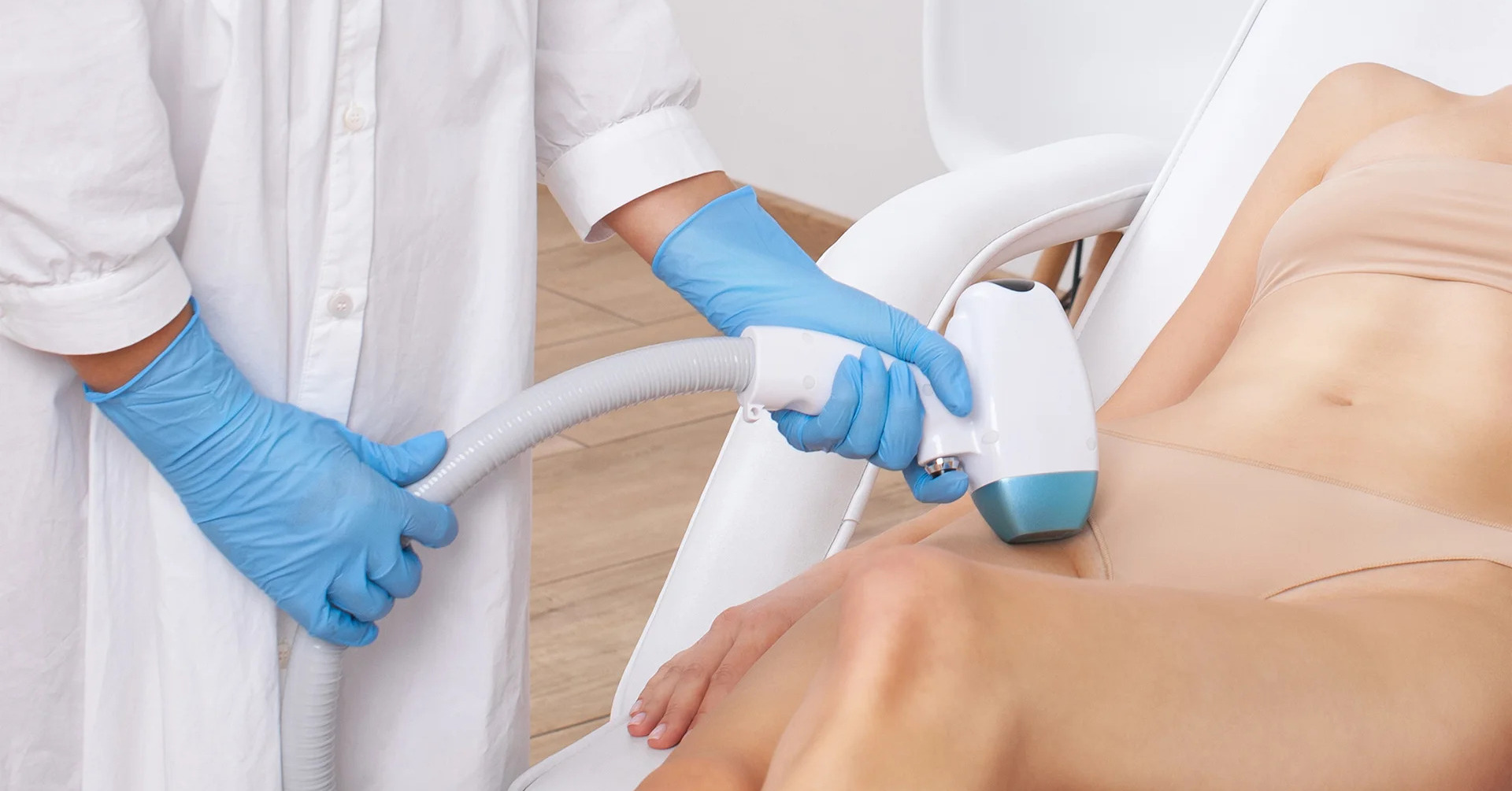Home>How-to Guides>For Women>How To Treat Hyperpigmentation From Laser Hair Removal


For Women
How To Treat Hyperpigmentation From Laser Hair Removal
Modified: September 23, 2023
Learn effective ways to treat hyperpigmentation caused by laser hair removal. This guide is specifically designed for women seeking solutions.
(Many of the links in this article redirect to a specific reviewed product. Your purchase of these products through affiliate links helps to generate commission for Under-tec.com, at no extra cost. Learn more)
Table of Contents
- Introduction
- Understanding Hyperpigmentation from Laser Hair Removal
- Factors Contributing to Hyperpigmentation
- Prevention of Hyperpigmentation
- Treating Hyperpigmentation from Laser Hair Removal
- Over-the-Counter Treatments
- Prescription Treatments
- Professional Treatments
- Home Remedies for Hyperpigmentation
- Dietary and Lifestyle Changes for Hyperpigmentation
- Conclusion
Introduction
Laser hair removal is a popular and effective method for achieving smooth, hair-free skin. However, one common concern that can arise from this treatment is the occurrence of hyperpigmentation. Hyperpigmentation is the darkening of the skin in the treated area, which can cause dissatisfaction and self-consciousness.
Understanding the causes of hyperpigmentation from laser hair removal is essential in order to prevent and treat this condition effectively. In this article, we will delve into the factors that contribute to hyperpigmentation, discuss preventative measures, and explore various treatment options available.
Hyperpigmentation occurs as a result of an overproduction of melanin, the pigment responsible for giving color to our skin, hair, and eyes. The laser used in hair removal targets the melanin within the hair follicles, heating them and destroying them. However, sometimes the surrounding skin can also be affected, leading to temporary or even long-term hyperpigmentation.
It’s important to note that hyperpigmentation can vary in severity, ranging from mild discoloration to more pronounced dark spots or patches. While it may be concerning, it is usually a temporary condition that tends to fade over time.
It is worth mentioning that hyperpigmentation is more likely to occur in individuals with darker skin tones, as they tend to have more melanin present in their skin. However, anyone undergoing laser hair removal is susceptible to this condition regardless of their skin type.
Although hyperpigmentation can be distressing, there are several ways to prevent and treat it effectively. By taking certain precautions before and after laser hair removal, and with the help of various treatment options, you can minimize the risk and mitigate the effects of hyperpigmentation. In the following sections, we will explore these approaches in more detail, providing you with the knowledge and tools to address this concern successfully.
Understanding Hyperpigmentation from Laser Hair Removal
Hyperpigmentation is a common side effect of laser hair removal and refers to the darkening of the skin in the treated area. Although it is typically temporary, it can still be a cause for concern. To better understand hyperpigmentation and its relationship to laser hair removal, let’s explore the underlying factors that contribute to this condition.
During laser hair removal, the laser emits intense beams of light that are absorbed by the pigment (melanin) in the hair follicles. This absorption causes the hair follicles to heat up and ultimately damages them, preventing future hair growth. While the treatment targets melanin in the hair, it’s important to note that the surrounding skin also contains melanin.
In some cases, the heat generated by the laser can inadvertently affect the surrounding skin, leading to temporary or prolonged hyperpigmentation. The excess heat triggers the production of melanin, resulting in darker patches or spots on the skin. The severity of hyperpigmentation can vary, ranging from mild discoloration to more noticeable dark spots.
Several factors contribute to the likelihood and severity of hyperpigmentation during laser hair removal. Firstly, individuals with darker skin tones are more predisposed to this side effect as they naturally have higher levels of melanin in their skin. Additionally, using higher intensity or improper laser settings, inappropriate aftercare, or not following the recommended treatment schedule can increase the risk of hyperpigmentation.
It’s important to note that the occurrence and duration of hyperpigmentation can vary from person to person. While some individuals may experience only temporary discoloration that fades over time, others might experience more persistent effects that require additional treatment.
While hyperpigmentation can be concerning, it is usually a benign condition that doesn’t cause any harm to your health. However, it can have an impact on your self-esteem and confidence, especially if it persists or becomes more noticeable.
In the next sections, we will discuss preventative measures to minimize the risk of hyperpigmentation, as well as various treatment options available to address this concern effectively. By understanding the causes and taking appropriate steps, you can make the most of your laser hair removal experience while reducing the chances of developing hyperpigmentation.
Factors Contributing to Hyperpigmentation
Hyperpigmentation from laser hair removal can result from various factors. By understanding these contributing factors, you can take proactive measures to minimize the risk of developing hyperpigmentation and ensure a more successful treatment outcome. Let’s explore these factors in more detail:
- Skin Type: Individuals with darker skin tones, such as Fitzpatrick skin types IV to VI, are more prone to hyperpigmentation. This is because darker skin has a higher concentration of melanin, making it more susceptible to excessive melanin production in response to laser treatment.
- Laser Settings: The laser settings used during hair removal play a significant role in the development of hyperpigmentation. Using higher intensity settings can increase the likelihood of heat transfer to the surrounding skin, leading to melanin production and subsequent darkening. It is crucial for the treatment provider to assess the individual’s skin type and adjust the laser settings accordingly.
- Sun Exposure: Exposure to the sun’s harmful UV rays before or after laser hair removal can exacerbate the risk of hyperpigmentation. Ultraviolet radiation stimulates melanocyte activity, leading to increased melanin production. It is essential to protect the treated area from the sun by applying broad-spectrum sunscreen and avoiding excessive sun exposure.
- Improper Aftercare: Following proper aftercare instructions is crucial in minimizing the risk of hyperpigmentation. Not adhering to recommended post-treatment care, such as avoiding hot showers, excessive sweating, or rough exfoliation, can irritate the skin and potentially trigger increased melanin production.
- Hormonal Factors: Hormonal fluctuations can also contribute to hyperpigmentation. Conditions such as polycystic ovary syndrome (PCOS) and pregnancy can cause hormonal imbalances, leading to increased melanin production and potential hyperpigmentation. It is essential to inform your treatment provider about any hormonal issues to customize the treatment accordingly.
While these factors play a significant role in hyperpigmentation from laser hair removal, it’s important to understand that individual responses can vary. Some people may be more predisposed to hyperpigmentation due to their skin type or hormonal factors, while others may experience minimal or no pigmentation issues.
By consulting with a qualified professional and taking appropriate precautions, you can significantly minimize the risk of experiencing hyperpigmentation. In the next sections, we will discuss preventive measures and various treatment options available to address hyperpigmentation effectively.
Prevention of Hyperpigmentation
While hyperpigmentation from laser hair removal can be a concern, there are several preventive measures you can take to minimize the risk of developing this condition. By being proactive and following these guidelines, you can ensure a more successful and satisfying treatment experience. Let’s explore some preventive strategies:
- Choose a qualified and experienced provider: Selecting a skilled and knowledgeable professional for your laser hair removal treatment is crucial. Ensure that the provider has experience working with different skin types and is well-versed in adjusting laser settings to minimize the risk of hyperpigmentation.
- Understand your skin type: Knowing your skin type is essential in determining the appropriate treatment approach. If you have darker skin, discuss it with your provider, as they may recommend using lower laser intensities or alternative laser technologies to minimize the risk of hyperpigmentation.
- Avoid sun exposure: Before and after laser hair removal, it is important to protect the treated area from the sun. Ultraviolet (UV) radiation can increase the production of melanin and exacerbate the risk of hyperpigmentation. Apply a broad-spectrum sunscreen with an SPF of 30 or higher and wear protective clothing when outdoors.
- Follow aftercare instructions: Your provider will provide specific aftercare instructions tailored to your needs. It is crucial to follow these instructions diligently to promote proper healing and reduce the risk of hyperpigmentation. Avoid hot showers, excessive sweating, abrasive scrubs, and harsh chemicals on the treated area.
- Inform your provider: It’s important to inform your provider about any existing skin conditions, hormonal changes, or medications you may be taking. Certain medications or conditions can increase the risk of hyperpigmentation, and your provider can adjust the treatment accordingly.
- Stay consistent with treatment sessions: Adhering to the recommended treatment schedule is vital for minimizing the risk of hyperpigmentation. Skipping sessions or extending the time between treatments can disrupt the laser’s targeted destruction of hair follicles, potentially leading to adverse effects such as hyperpigmentation.
By following these preventive measures, you can significantly reduce the likelihood of developing hyperpigmentation from laser hair removal. However, it is important to note that there’s no foolproof method to completely eliminate the risk. In the following sections, we will explore various treatment options available for addressing hyperpigmentation should it occur, ranging from over-the-counter remedies to professional treatments.
Treating Hyperpigmentation from Laser Hair Removal
If hyperpigmentation occurs after laser hair removal, there are several treatment options available to help reduce its appearance and promote an even skin tone. The choice of treatment depends on the severity and duration of hyperpigmentation. Let’s explore some of these treatment options:
Over-the-Counter Treatments
Over-the-counter (OTC) products can be effective in treating mild cases of hyperpigmentation. Look for topical creams or serums that contain ingredients such as hydroquinone, kojic acid, vitamin C, niacinamide, or alpha hydroxy acids (AHAs). These ingredients help to lighten the darkened areas of the skin and promote cellular turnover, gradually reducing hyperpigmentation over time. It’s important to follow the instructions and be patient, as results may take several weeks to appear.
Prescription Treatments
If OTC treatments don’t provide satisfactory results, you may consider prescription-strength options. These treatments typically contain higher concentrations of active ingredients, such as hydroquinone, retinoids, or corticosteroids. Discuss these options with a dermatologist to determine the most suitable prescription treatment for your specific needs. Dermatologists can also provide guidance on usage, potential side effects, and duration of treatment.
Professional Treatments
For more stubborn or severe cases of hyperpigmentation, professional treatments performed by dermatologists or skincare specialists can be highly effective. Some of the commonly used professional treatments include:
- Laser treatments: In certain cases, laser treatments specifically targeted at reducing hyperpigmentation can be used. These treatments work by breaking up the excess melanin in the skin and promoting its gradual fading.
- Chemical peels: Chemical peels involve the application of a chemical solution to the skin, which helps remove the outer layers, including the darkened pigmented areas. This promotes the growth of new, healthier skin cells, resulting in a more even skin tone.
- Microneedling: Microneedling uses tiny needles to create controlled micro-injuries in the skin. This triggers the natural healing process, stimulating collagen production and helping to fade hyperpigmentation.
- Cryotherapy: In this treatment, liquid nitrogen is applied to freeze and destroy the excess melanin. The treated area then undergoes a healing process, resulting in a reduction in hyperpigmentation.
It’s important to consult with a professional to determine which treatment option is most suitable for your specific case. They will assess the severity of your hyperpigmentation and recommend the most appropriate course of action.
Home Remedies for Hyperpigmentation
While not as effective as professional treatments, some individuals prefer to try natural home remedies for hyperpigmentation. These remedies include applying ingredients like lemon juice, aloe vera, apple cider vinegar, or honey to the affected areas. While these remedies may offer some benefits, it’s important to note that their effectiveness can vary, and results may be gradual.
Regardless of the treatment chosen, it’s crucial to practice good sun protection habits during and after treatment. Applying sunscreen, wearing protective clothing, and avoiding excessive sun exposure can help prevent further darkening and promote better treatment outcomes.
It’s important to remember that each individual’s response to treatment may vary, and it may take time to see visible improvements. Consistency and patience are key when treating hyperpigmentation from laser hair removal. Consult with a healthcare professional for personalized guidance on the best treatment approach for your specific condition.
Over-the-Counter Treatments
When it comes to treating mild cases of hyperpigmentation from laser hair removal, over-the-counter (OTC) products can be a convenient and accessible option. These products are designed to help lighten dark spots and promote a more even skin tone. Here are some common OTC treatments to consider:
Topical Creams and Serums
Look for OTC creams or serums that contain ingredients known for their skin brightening and lightening properties. Some key ingredients to look for include:
- Hydroquinone: This is a widely used ingredient known for its skin-lightening effects. Hydroquinone works by inhibiting the production of melanin, the pigment responsible for dark spots.
- Kojic acid: Derived from certain fungi, kojic acid is another popular ingredient that helps inhibit melanin production, thereby lightening the skin.
- Vitamin C: Vitamin C is an antioxidant that helps fade dark spots and brighten the overall complexion. Look for products with stabilized forms of vitamin C, such as ascorbic acid or sodium ascorbyl phosphate.
- Niacinamide: Also known as vitamin B3, niacinamide helps to reduce hyperpigmentation by inhibiting melanin transfer and promoting skin cell turnover.
- Alpha hydroxy acids (AHAs): AHAs, such as glycolic acid and lactic acid, exfoliate the skin gently, helping to remove dead skin cells and fade dark spots over time.
When using OTC creams or serums, it’s important to follow the instructions carefully. Apply the product to clean, dry skin and allow it to absorb before applying any other products or makeup. Consistency is key, and it may take several weeks or even months of regular use to see noticeable improvements in hyperpigmentation.
Sunscreen
Wearing sunscreen is essential for preventing further darkening and protecting the skin from harmful UV rays. Look for a broad-spectrum sunscreen with an SPF of 30 or higher. Apply it generously to all exposed areas, including the treated area, and reapply every two hours or more frequently if sweating or spending extended periods of time outdoors. Sunscreen not only helps prevent hyperpigmentation from worsening but also allows other treatment products to work more effectively.
Keep in mind that while OTC treatments can be effective for mild cases of hyperpigmentation, they may not provide the same level of effectiveness as prescription or professional treatments. If you have more severe or persistent hyperpigmentation, it may be advisable to consult with a dermatologist or skincare professional for further evaluation and guidance.
Lastly, it’s important to manage your expectations when using OTC treatments. Results may vary, and it may take time to see visible improvements. Patience and consistency are key when it comes to treating hyperpigmentation from laser hair removal.
Prescription Treatments
If over-the-counter (OTC) treatments are not providing satisfactory results in treating hyperpigmentation from laser hair removal, there are prescription-strength options available that can offer a more potent and targeted approach. These treatments usually contain higher concentrations of active ingredients and may require a consultation with a dermatologist or skincare professional. Here are some common prescription treatments for hyperpigmentation:
Hydroquinone
Hydroquinone is a commonly prescribed ingredient for treating hyperpigmentation. It works by inhibiting the production of melanin, the pigment responsible for dark spots on the skin. Prescription-strength hydroquinone creams typically contain higher concentrations (up to 4%) than their OTC counterparts, making them more effective in fading hyperpigmentation. However, it is essential to use hydroquinone under the guidance of a healthcare professional, as prolonged or excessive use can potentially lead to skin irritation or other side effects.
Retinoids
Retinoids, such as tretinoin (Retin-A) or adapalene, are derived from vitamin A and are commonly prescribed for various skin concerns, including hyperpigmentation. These topical treatments work by increasing cell turnover, promoting the shedding of pigmented skin cells and encouraging the growth of new, healthier skin. Retinoids can help even out the skin tone and improve the appearance of hyperpigmentation over time. However, they can cause skin sensitivity and require diligent use of sunscreen to protect the skin from increased sun sensitivity associated with retinoid use.
Corticosteroids
In some cases, healthcare professionals may prescribe corticosteroid creams to help reduce inflammation and hyperpigmentation associated with laser hair removal. These topical treatments can help calm the skin and minimize the appearance of dark spots. It’s important to note that corticosteroids should only be used under the guidance of a healthcare professional and for a limited duration, as prolonged use can have potential side effects.
When using prescription treatments, it’s crucial to follow the instructions provided by the healthcare professional. They may recommend specific application techniques and usage guidelines to ensure the safe and effective use of these treatments. It’s also important to communicate any concerns or changes in your skin to your healthcare professional during the course of treatment for proper monitoring and adjustment, if needed.
Prescription treatments are typically more potent and targeted than OTC options, and as such, they may yield more noticeable results for individuals with moderate to severe hyperpigmentation. However, they should only be used under the supervision and guidance of a healthcare professional, who will assess your specific needs and tailor the treatment plan to your unique skin condition.
Always consult with a dermatologist or skincare professional to determine the most appropriate prescription treatment for your specific case of laser hair removal-induced hyperpigmentation.
Professional Treatments
When over-the-counter remedies and prescription treatments do not provide the desired results for treating hyperpigmentation from laser hair removal, professional treatments performed by dermatologists or skincare specialists can offer more advanced and targeted solutions. These treatments are typically conducted in a clinical setting and can provide effective results for individuals with more stubborn or severe hyperpigmentation. Let’s explore some common professional treatments for hyperpigmentation:
Laser Treatments
Laser treatments are commonly used for addressing hyperpigmentation caused by laser hair removal. Specifically targeted lasers emit high-energy light beams that can break up excess melanin in the skin and encourage its gradual fading. Different laser types, such as fractional lasers or Q-switched lasers, may be used based on the specific characteristics of the hyperpigmentation. Multiple treatment sessions may be required to achieve optimal results, and downtime and potential side effects may vary depending on the intensity and type of laser used.
Chemical Peels
Chemical peels involve the application of a chemical solution to the skin, which helps remove the outer layers, including the darkened pigmented areas. This process stimulates the growth of new, healthier skin cells, resulting in a more even skin tone. Chemical peels vary in intensity, from superficial to deep, and a healthcare professional can determine the most suitable type for your specific case. Recovery time and potential side effects may vary depending on the depth of the peel.
Microneedling
Microneedling, also known as collagen induction therapy, uses tiny needles to create controlled micro-injuries in the skin. This process triggers the natural healing response, stimulating collagen production and promoting skin rejuvenation. Microneedling can help reduce hyperpigmentation by promoting the turnover of pigmented skin cells and revealing brighter, more even-toned skin. Several sessions may be required for optimal results, and downtime and potential side effects are typically minimal.
Cryotherapy
Cryotherapy is a treatment that involves the application of liquid nitrogen to freeze and destroy excess melanin in the skin. The treated area then undergoes a healing process, leading to a reduction in hyperpigmentation. Cryotherapy can be an effective option for certain types of hyperpigmentation, particularly small dark spots. It is important to consult with a professional to determine if cryotherapy is suitable for your specific condition.
Professional treatments for hyperpigmentation offer more advanced and targeted approaches than over-the-counter and prescription treatments. However, it’s important to note that these treatments require proper evaluation and guidance from a healthcare professional. They will assess your skin condition, recommend the most suitable treatment option, and ensure your safety and satisfaction throughout the process.
Keep in mind that the number of treatments needed and the results may vary depending on the severity and nature of your hyperpigmentation. It is crucial to have realistic expectations and to follow the recommended aftercare instructions provided by your healthcare professional to optimize your treatment outcomes.
Home Remedies for Hyperpigmentation
While professional treatments and medical interventions are often recommended for treating hyperpigmentation from laser hair removal, some individuals prefer to explore natural home remedies as a more cost-effective and convenient option. While home remedies may not provide the same level of effectiveness as medical treatments, they can still offer some benefits in reducing the appearance of hyperpigmentation. Here are a few home remedies worth considering:
Lemon Juice
Lemon juice is a common ingredient known for its natural bleaching properties. Its high concentration of citric acid acts as a mild exfoliant and helps lighten dark spots. Squeeze fresh lemon juice and apply it directly to the affected area using a cotton ball. Leave it on for about 10-15 minutes, then rinse off with lukewarm water. Be cautious, as lemon juice can be drying and sensitive skin may be more prone to irritation. It’s important to note that lemon juice may not be suitable for all skin types and may not provide immediate results.
Aloe Vera
Aloe vera is a soothing and hydrating plant known for its healing properties. It can also help lighten hyperpigmentation over time. Extract fresh aloe vera gel from an aloe leaf and apply it directly to the affected areas. Leave it on for 20-30 minutes, then rinse off with water. Aloe vera can be used daily as part of your skincare routine to help fade hyperpigmentation gradually.
Apple Cider Vinegar
Apple cider vinegar contains acetic acid, which has been used for its skin-brightening properties. Dilute apple cider vinegar with water (1 part vinegar to 3 parts water) and apply it to the hyperpigmented areas using a cotton ball. Leave it on for a few minutes, then rinse off with water. It’s important to perform a patch test first, as undiluted apple cider vinegar can be harsh on the skin. Regular use over time may help reduce the appearance of hyperpigmentation.
Honey
Honey is a natural moisturizer and contains antioxidants that can aid in the lightening of dark spots. Apply a thin layer of raw, organic honey directly onto the affected areas and leave it on for 20-30 minutes. Rinse off with lukewarm water. Honey can be used daily as a natural remedy for hyperpigmentation.
It’s important to note that home remedies may not provide dramatic or immediate results. Consistency is key, as it may take several weeks or even months of regular use to see noticeable improvements. Additionally, it’s important to practice sun protection by wearing sunscreen and avoiding excessive sun exposure, as UV radiation can worsen hyperpigmentation.
While home remedies can be a more accessible option for some individuals, consulting with a dermatologist or skincare professional is still advisable, especially for severe or persistent cases of hyperpigmentation. They can provide personalized guidance, recommend appropriate treatments, and ensure your safety and satisfaction with the results.
Dietary and Lifestyle Changes for Hyperpigmentation
In addition to topical treatments and professional interventions, making certain dietary and lifestyle changes can also support the management of hyperpigmentation from laser hair removal. While these changes may not directly treat hyperpigmentation, they can help promote overall skin health and potentially improve the appearance of dark spots. Here are some dietary and lifestyle considerations to keep in mind:
Antioxidant-Rich Diet
Consuming a diet rich in antioxidants can help protect the skin from free radicals and promote skin healing. Include a variety of fruits and vegetables such as berries, leafy greens, citrus fruits, and tomatoes in your daily meals. These foods are known for their high concentrations of antioxidants, vitamins, and minerals that can support skin health and potentially help reduce hyperpigmentation.
Hydration
Proper hydration is essential for maintaining healthy skin. Drink an adequate amount of water throughout the day to keep your skin hydrated and support its natural healing processes. Hydrated skin is more likely to have a healthy complexion and may help diminish the appearance of hyperpigmentation.
Sun Protection
Protecting your skin from the sun is crucial in preventing further darkening and managing hyperpigmentation. UV radiation can stimulate melanin production, leading to increased pigmentation. Apply a broad-spectrum sunscreen with an SPF of 30 or higher daily, even on cloudy days. Additionally, consider wearing protective clothing, like hats and sunglasses, and seek shade during peak sun hours.
Gentle Skincare Routine
Adopt a gentle skincare routine that doesn’t irritate the skin. Avoid harsh, abrasive cleansers or scrubs that can aggravate hyperpigmentation. Instead, use mild cleansers and moisturizers suitable for your skin type. Be gentle when applying and removing products to avoid further inflammation or irritation.
Stress Management
Chronic stress can contribute to various skin issues, including hyperpigmentation. Find healthy ways to manage stress, such as practicing meditation, deep breathing exercises, or engaging in physical activities you enjoy. Taking care of your mental well-being can have a positive impact on your skin health.
Medical Conditions
Hormonal imbalances or medical conditions like polycystic ovary syndrome (PCOS) can contribute to hyperpigmentation. If you suspect any underlying medical conditions, consult with a healthcare professional for appropriate diagnosis and treatment. Treating the root cause may help manage hyperpigmentation more effectively.
While dietary and lifestyle changes may not provide immediate or drastic results, they can work synergistically with other treatment approaches and contribute to overall skin health. It’s essential to be patient and consistent with these changes, as improvements in hyperpigmentation may take time to become visible.
Nevertheless, it’s important to remember that these suggestions are not meant to replace professional advice. If you’re dealing with severe or persistent hyperpigmentation, it’s recommended to consult with a dermatologist or skincare professional who can provide personalized guidance, evaluate your specific condition, and offer the most suitable treatment options.
Conclusion
Hyperpigmentation from laser hair removal is a common concern, but there are various preventive measures and treatment options available to manage and reduce its appearance. Understanding the factors that contribute to hyperpigmentation, such as skin type, laser settings, sun exposure, and improper aftercare, can help minimize the risk of developing this condition. By following recommended precautions and maintaining good sun protection habits, you can enhance the success of your laser hair removal treatment and reduce the likelihood of hyperpigmentation.
In cases where hyperpigmentation does occur, different treatment options can help improve its appearance. Over-the-counter treatments, such as topical creams or serums containing ingredients like hydroquinone or vitamin C, can be effective for mild cases. Prescription treatments, like hydroquinone, retinoids, or corticosteroids, can provide stronger and more targeted results in moderate to severe cases. Professional treatments, including laser treatments, chemical peels, microneedling, or cryotherapy, offer advanced options for individuals with stubborn or persistent hyperpigmentation.
It’s important to note that home remedies, such as lemon juice, aloe vera, apple cider vinegar, or honey, may offer some benefits, but their effectiveness may be limited compared to medical interventions. Additionally, making certain dietary and lifestyle changes, such as adopting an antioxidant-rich diet, staying hydrated, practicing sun protection, and managing stress, can support overall skin health and potentially improve the appearance of hyperpigmentation.
It’s crucial to consult with a skincare professional or dermatologist to assess your specific condition, determine the most suitable treatment plan, and ensure proper guidance throughout the process. They can provide personalized advice based on your skin type, severity of hyperpigmentation, and treatment goals.
Remember, treating hyperpigmentation requires patience and consistency. Results may vary depending on individual factors, and it may take time to see visible improvements. By taking proactive steps, following professional advice, and staying committed to your skincare routine, you can effectively manage hyperpigmentation and achieve a more even and radiant complexion.






